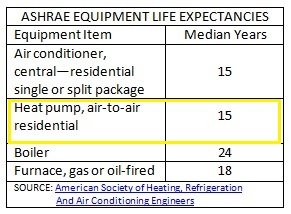Heat Pump Life Expectancy In Seattle: How Long Do They Last
The weather in the Seattle area has a significant effect on a heat pump life expectancy in the Pacific Northwest. When the area experiences longer and colder winters, the heat pump runs longer, which can shorten its lifespan. Seattle’s climate is temperate, marine, or oceanic. It’s characterized by a few days of freezing cold in winter and unbearably hot and dry summer days.
With a typically moderate climate, homes in Seattle usually have a heat pump system installed to control the warmth or coolness of their homes. In Seattle, a heat pump is one of an HVAC’s most energy-efficient systems. If you have installed one in your Seattle home, you might be wondering how long the heat pump would last. It requires significant investment, so it is important to maximize its use and, if possible, extend its life.
The maintenance that you give your heat pump also affects its lifespan. If your system is regularly serviced, it can even increase its lifespan by up to three years.
What Is A Heat Pump
If you are still new to HVAC systems, a heat pump is a device that regulates the heating or cooling of a home. It functions by moving heat from one area to another. When it is warm, the heat pump diverts the heat from inside the home to outside. When the weather is cool, it does the opposite.
Various types of heat pumps are available in the market. The air-source heat pump is the most common. It functions by transferring air between the indoors and outside environment. Not so common is the water-source pump, which draws heat from the warmer temperatures under the ground. There is also the dual-source pump that has the features of an air-source and a water-source heat pump. This has the longest heat pump life expectancy among the three.
Installing a heat pump in Seattle is more efficient than just having air conditioners. Heat pumps can cool and heat a home. Ideally, heat pumps are effective for areas where the outside temperature is about 50 °F (10 °C).
How Long Does A Heat Pump Last
The heat pump's life expectancy typically lasts for about 15 years. In reality, life expectancy depends on various factors. Variables include your location, the level of maintenance, and the type of heat pump you have. Some heat pumps only last for ten years. Newer units that are currently produced usually last longer due to developments in technology.
and the type of heat pump you have. Some heat pumps only last for ten years. Newer units that are currently produced usually last longer due to developments in technology.
Determining Factors In A Heat Pump’s Lifespan
Several factors help determine heat pump life expectancy. One is the weather in your area. Your heat pump will work longer hours when you live in a place where the winters are longer and colder. This contributes to the shortening of its lifespan.
How consistently you provide proper maintenance to your system also affects heat pump life expectancy. Experts say that regularly serviced heat pumps can last an additional two to three years.
The surveys and studies of the Air Conditioning, Heating & Refrigeration Institute (AHRI) and the National Association of Home Builders (NAHB) put the average heat pump life expectancy between 14 and 16 years if the system is regularly maintained.
Typically, based on the frequency of usage, a heat pump could last for up to 20 years, but the average is 16. A heat pump is like an air conditioner, but it is capable of cooling and heating, which means the system is used longer annually. If you are located in a coastal area, it is possible that the service life of your heat pump could be shortened. Expect to use it between seven to twelve years.
The longevity of a heat pump is variable as there are several contributing factors. The type of system also affects its life. Some of the factors that affect the service life of a heat pump include:
- Poor maintenance
- Poor quality of the unit and/or defective parts
- Oversizing or under-sizing of the system based on the size of the home
- Improper procedures for installation
- Excessively high usage
- Improper use, for example, letting the system run with doors and windows open
- Installation in an environment that is corrosive or salty
Of all the factors that affect the longevity of a heat pump, oversizing and poor maintenance are the most damaging. Wear and tear of many parts are accelerated due to lack of maintenance. Oversizing leads to more often on and off cycling of the system, which can overwork the blower motor or compressor, causing the part to fail. If you are located in a coastal area, the condenser unit is susceptible to corrosion.
These are the most common issues that affect the life expectancy of a heat pump. If they can afford it, homeowners in Seattle choose to replace their heat pump before its full lifespan. It’s because as the system gets older, the reliability of the heat pump is lowered, and its efficiency is reduced. The situation leads to an increased cost of utility and frequent repair. Once the heat pump is about 10 – 15 years old, the monthly savings a Seattle homeowner will realize by upgrading to a more efficient and newer model can justify the initial cost of the unit, especially if the older unit is starting to be unreliable.
Maximizing A Heat Pump’s Life Expectancy
The most important factor that determines heat pump life expectancy is its maintenance. Fischer Heating, a Seattle-grown company, provides professional heat pump maintenance and repair. Like any hard-working machinery, a heat pump requires regular maintenance to ensure that it functions smoothly and efficiently.
To achieve a longer heat pump life expectancy, a pre-season checkup and cleaning are needed. Ideally, it should be done in the spring and fall. Schedule a quality maintenance checkup and cleaning with Fischer Heating.
Here are some tips to maintain your heat pump and signs that indicate it needs repair:
- Ice buildup on the outside coil. It can cause frost, which can hamper the ability of the heat pump to produce heat. You should also check if the defrost cycle works properly.
- Clean and/or replace air filters regularly. Dirty air filters will hamper the flow of air to your system, causing it to work harder.
- Check the outside condenser unit and clean the fins of accumulated dust or debris.
- Always remove accumulated dirt and dust on the pump’s coils. A degreasing cleaner is an effective dirt remover.
- See to it that grass and plant growth are 18 inches away from the outdoor unit of the heat pump system.
- Check the outdoor unit for leaks and corrosion.
Install a programmable thermostat to give your heat pump a break when everyone’s out of the house.
No one can guarantee or predict heat pump life expectancy, but following the maintenance tips can help your system run efficiently and smoothly. Call Fischer Heating for expert advice and services. We have licensed technicians who can visit your home, do regular checkups, and recommend the proper maintenance or repair services for you. Contact us today.
